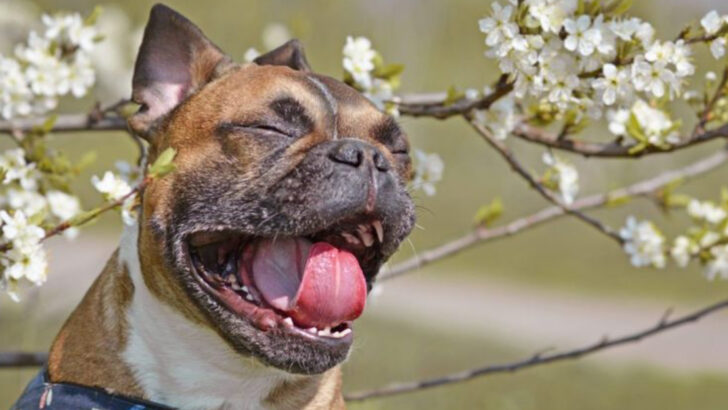Your dog isn’t just being dramatic—those sneezes might mean war.
Pollen season isn’t just a human nightmare.
Dogs itch, scratch, lick, and sniffle their way through it, too.
And while it might start with a cute little head tilt or nose twitch… it can spiral into full-blown misery faster than you can say “antihistamine.”
Red paws? Check.
Watery eyes? You bet.
Midnight scratching that rattles the whole house? Oh, it’s real.
If your pup is acting off every spring or fall, it’s not in their head—it’s in the air.
Here are 14 telltale signs your dog is battling seasonal allergies and what you can do right now to help them feel like themselves again.
Let’s kick allergy season to the curb—before it drives you both mad.
Excessive Scratching
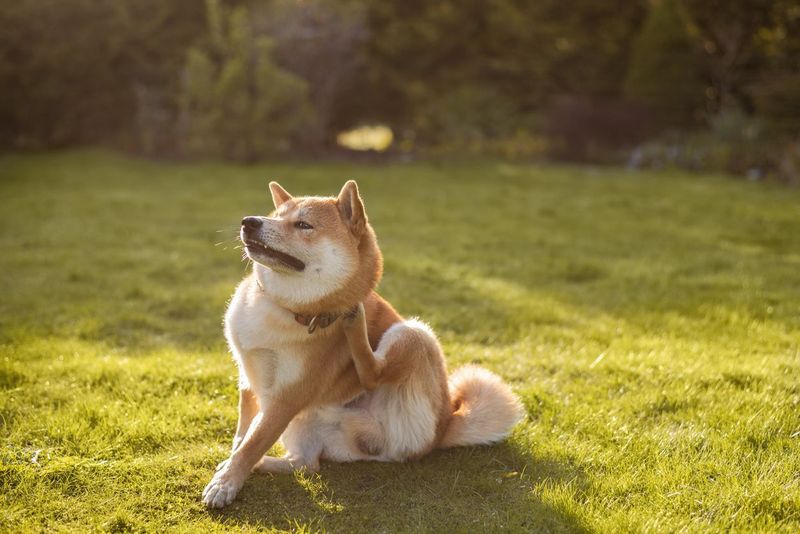
When your dog starts scratching like there’s no tomorrow, it might not just be an itch. Excessive scratching is often a telltale sign of allergies. Your dog’s skin could be reacting to pollen, dust, or other allergens floating in the air. This constant itchiness can lead to bald patches and even skin infections if not addressed promptly.
To help your pup, consider giving them a soothing oatmeal bath or applying a veterinarian-recommended anti-itch cream. Regular grooming and keeping your dog’s environment clean can also reduce allergen exposure.
Red, Irritated Skin
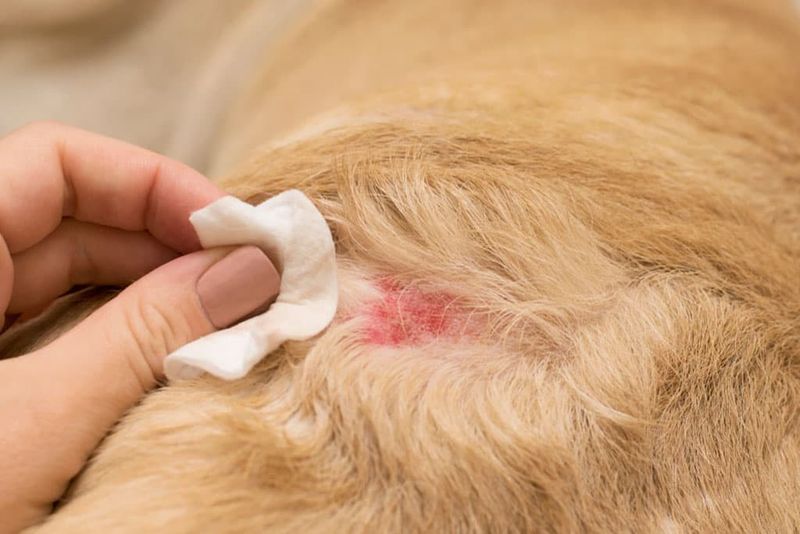
Imagine how you’d feel with sunburned skin; that’s how your dog feels with red, irritated skin due to allergies. This condition can cause discomfort and restlessness. You might notice your dog biting or licking the affected area trying to find relief.
A hypoallergenic diet and consulting your vet for antihistamines can help ease the condition. Keep an eye on seasonal changes and adjust your dog’s routine accordingly. Ensuring their bedding is clean and free of allergens is also beneficial.
Sneezing and Sniffling
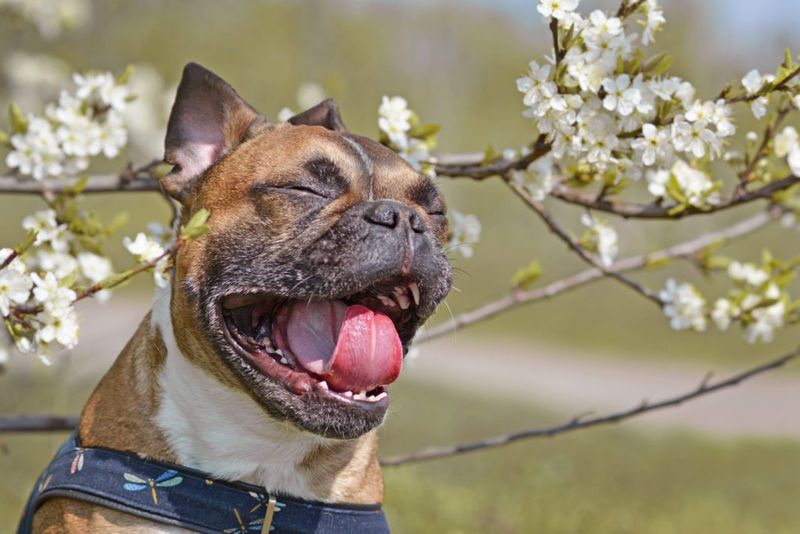
If your dog sounds like they caught a cold, sneezing and sniffling, they could be reacting to seasonal allergens. This can be particularly noticeable during walks in the park or after spending time outdoors.
Wiping your dog’s paws and face after coming inside can help reduce pollen exposure. Using air purifiers at home can also make a significant difference. Consultation with your vet can lead to medication that eases these symptoms.
Watery Eyes
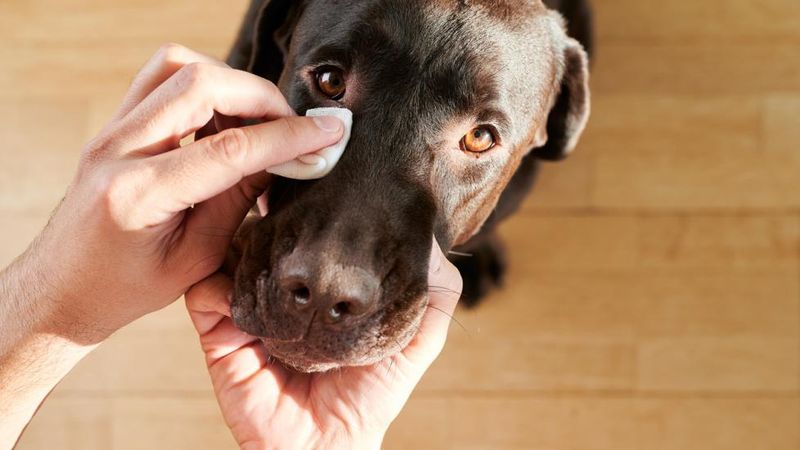
Your dog’s eyes may be the windows to their soul, but if they’re watery, it might be a sign of allergies. Watery eyes can be a reaction to allergens like pollen, dust, or mold. It can make your dog feel uncomfortable and can lead to further eye infections if not treated.
Using a pet-safe saline eye rinse can help soothe their eyes. It’s also wise to keep their sleeping area clean and free of dust. Consult your vet for the best approach to manage this symptom.
Ear Infections
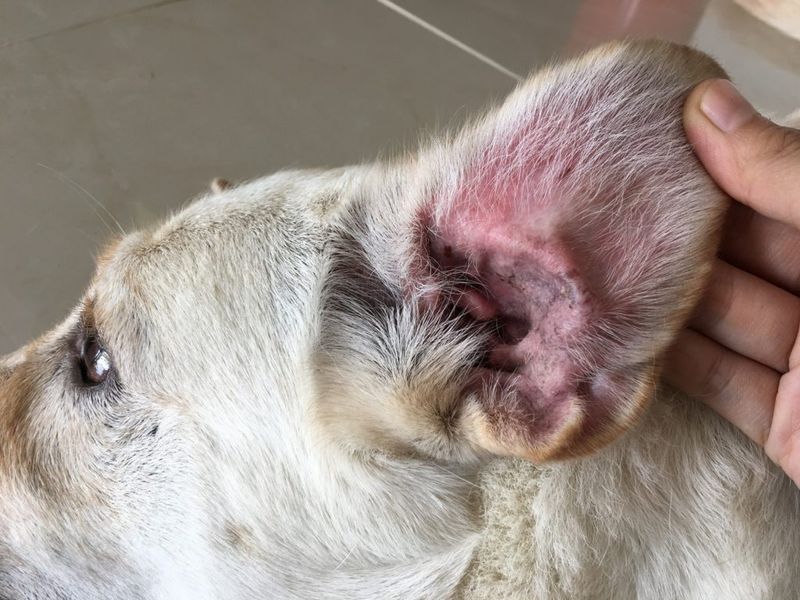
Those adorable floppy ears can sometimes trap moisture and allergens, leading to ear infections. If your dog is shaking their head or scratching their ears excessively, it might be time for an inspection.
Regular ear cleaning with vet-approved solutions can prevent infections. Ensure your dog’s ears are dry and clean, especially after baths or swimming. Monitoring their behavior can help catch infections early, before they become severe.
Paw Licking
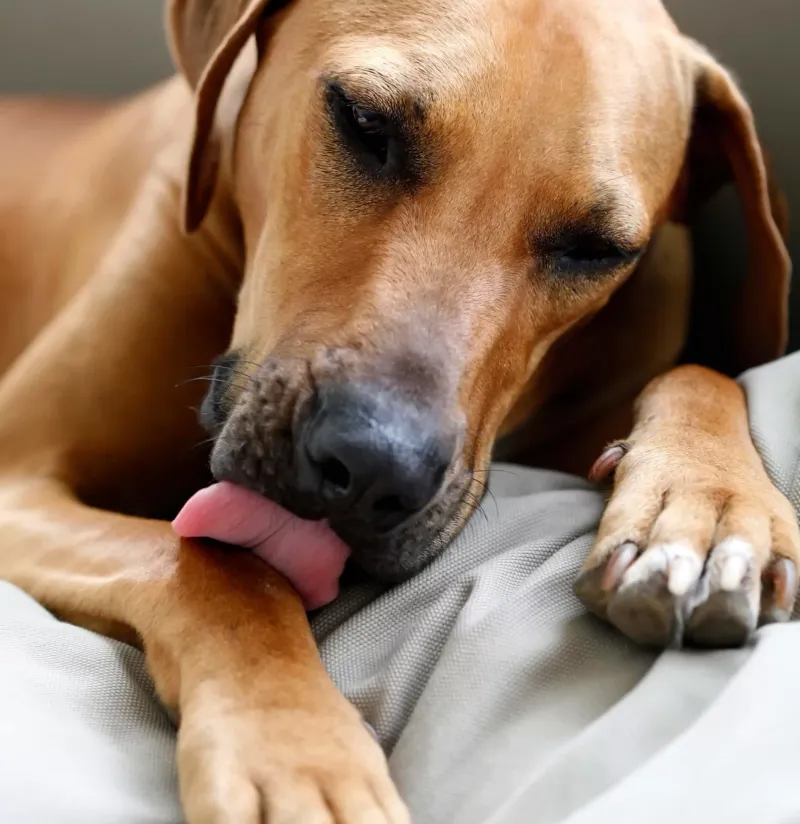
Paw licking might seem like a quirky habit, but it’s often a sign of allergies. Your dog’s paws come into contact with allergens like grass, pollen, and dust. Constant licking can lead to sore, red paws and even infections.
Wiping your dog’s paws after walks and using protective booties can limit exposure to allergens. If the habit continues, consult your vet for allergy testing and appropriate treatments.
Runny Nose

A runny nose isn’t just a human woe; dogs can have it too, especially when allergies strike. If you notice your dog with a constant nasal drip, it might be reacting to allergens in the air.
Ensuring your dog has a clean living environment, free from dust and pollen, helps reduce symptoms. Consult your vet for the best allergy management practices, which may include medications or lifestyle changes.
Coughing
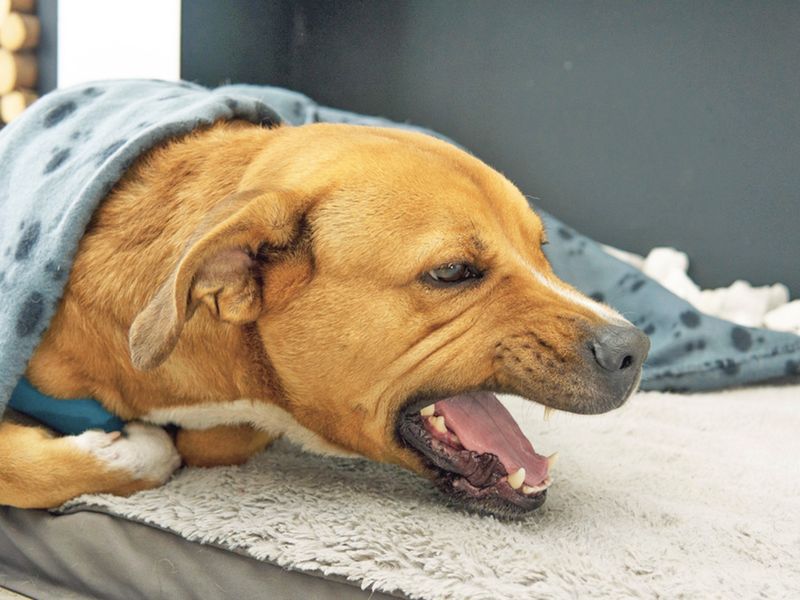
A cough can be more than just a tickle in your dog’s throat. Seasonal allergies can cause coughing due to irritation in the airways. This can be uncomfortable for your dog and may disrupt their daily activities.
Using a humidifier at home may ease breathing, and ensuring your dog is hydrated can help alleviate coughing. If persistent, consulting your vet is essential to rule out other causes and to obtain appropriate relief.
Lethargy

Even the most energetic dogs can become lethargic when battling allergies. This lack of energy might be due to discomfort or a reaction to allergens. You may notice your dog napping more and showing less interest in their usual playtime.
Ensuring a comfortable, allergen-free resting space and maintaining regular vet check-ups can keep your dog active and healthy. Dietary changes might also be necessary to boost their energy levels.
Digestive Issues

Allergies can affect your dog’s digestive system, leading to issues like vomiting or diarrhea. This can occur when your dog ingests something they’re allergic to or reacts to airborne allergens.
Switching to a hypoallergenic diet and feeding them easily digestible foods can help. Monitoring their eating habits and consulting your vet ensures any digestive problems are promptly addressed.
Hot Spots
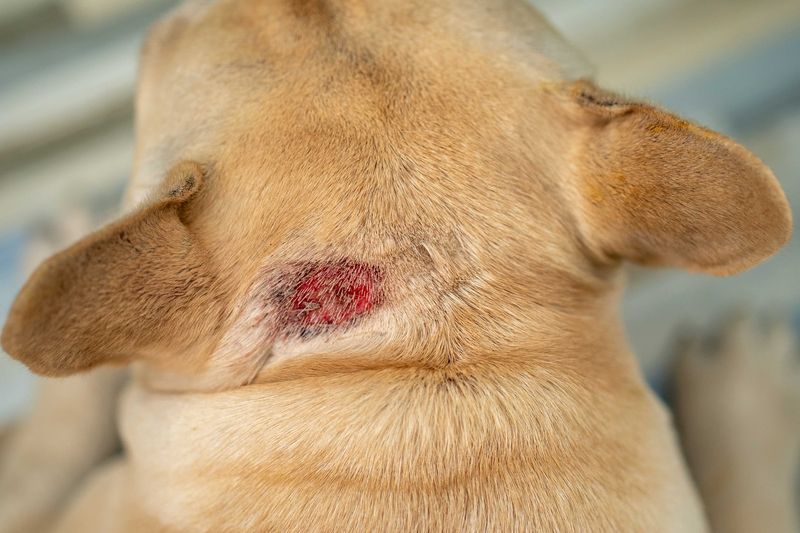
Hot spots are red, inflamed skin areas that can appear suddenly. Allergies often exacerbate these spots, causing your dog significant irritation and discomfort. They might be seen scratching or biting at these spots incessantly.
Keeping your dog’s fur clean and trimmed can help manage hot spots. Anti-inflammatory creams or sprays recommended by your vet can provide relief. Regular observation of your dog’s skin condition is key to preventing serious infections.
Restlessness
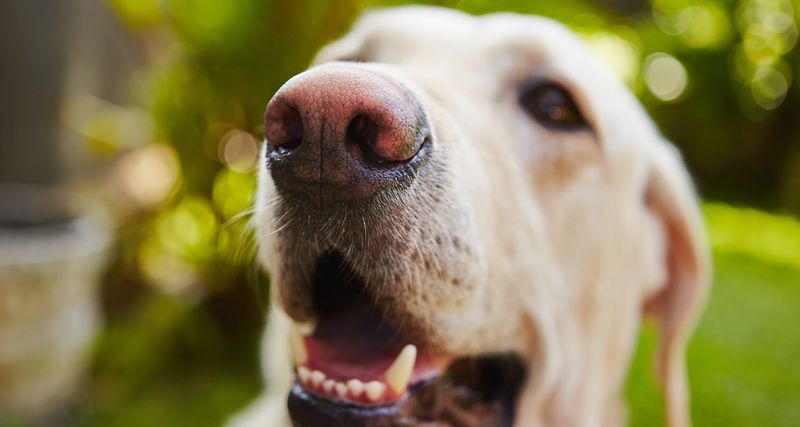
If your usually calm dog is suddenly restless, allergies could be to blame. The discomfort from itching and irritation can make it hard for them to settle down and relax.
Ensuring they have a comfortable space and using calming pheromone diffusers can create a peaceful environment. Consulting your vet for allergy treatments is advisable to improve their comfort and reduce restlessness.
Swollen Eyes
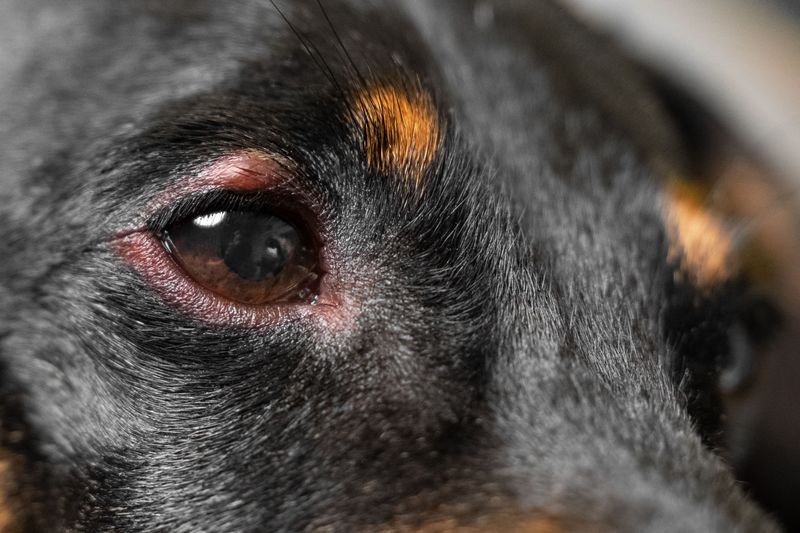
Swollen eyes can make your dog look like they’ve had a rough night. Allergies can cause swelling and irritation around the eyes, adding to their discomfort. It can also be a precursor to more severe allergic reactions.
Applying a cool compress gently can alleviate swelling. Keeping their sleeping area dust-free and consulting your vet for antihistamines can manage symptoms effectively.
Chewing on Skin
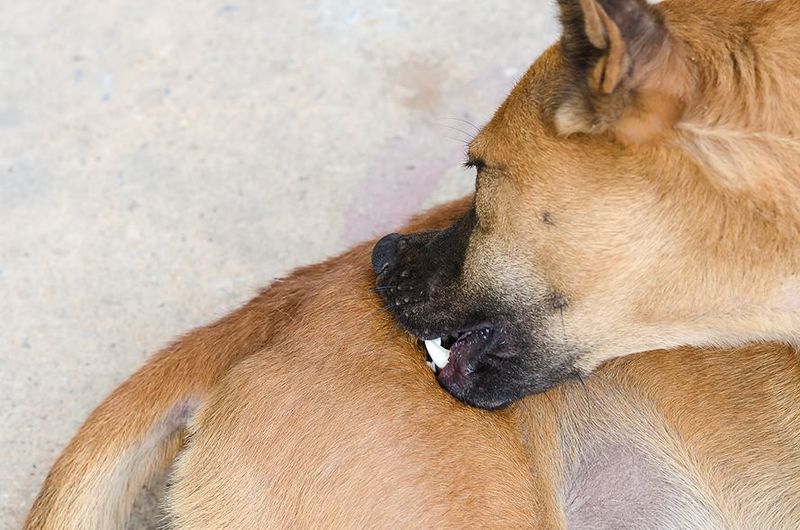
If you catch your dog chewing on their skin, it’s more than just a peculiar habit. Allergies often cause itchy skin, prompting dogs to chew at themselves for relief. This can lead to open wounds and infections if not addressed quickly.
Providing soothing baths and ensuring their diet is free from allergens can help. Your vet might recommend specific treatments to reduce itching and prevent further chewing.

